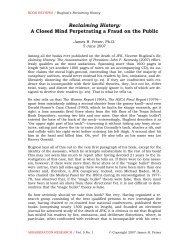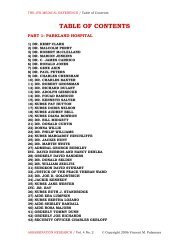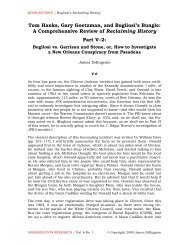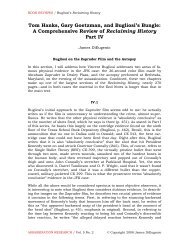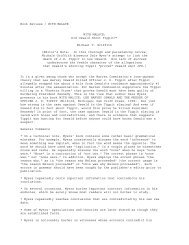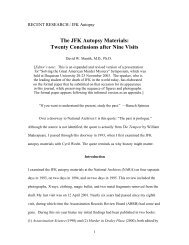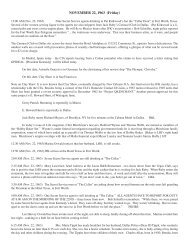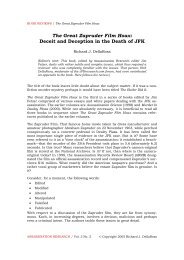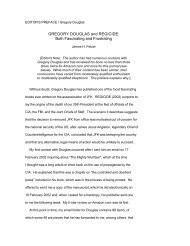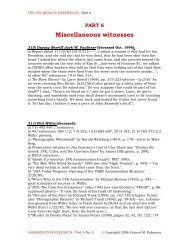A Comprehensive Review of Reclaiming History Part VIII
A Comprehensive Review of Reclaiming History Part VIII
A Comprehensive Review of Reclaiming History Part VIII
You also want an ePaper? Increase the reach of your titles
YUMPU automatically turns print PDFs into web optimized ePapers that Google loves.
James DiEugenio 4 Bugliosi’s Bungle, <strong>Part</strong> <strong>VIII</strong><br />
vestigate or search for new evidence or witnesses with detectives <strong>of</strong> their own.<br />
With what we know today about the work <strong>of</strong> the bodies the Commission relied<br />
upon, this was an error <strong>of</strong> judgment similar to General Custer at the Little Big<br />
Horn.<br />
Just how emasculated was Chief Justice Earl Warren on the Kennedy case?<br />
From this point, he went on to say that the hearings should not be held in public;<br />
he thought that their report would carry more influence done secretly than<br />
if it were done in the open. Incredibly, he even wanted the Commission to hear<br />
no witnesses, nor even have the power to subpoena them! He added that this<br />
would “retard rather than help our investigation”. At this first meeting, Warren<br />
was clearly carrying water for President Johnson, for he added that one function<br />
<strong>of</strong> the Commission was to head <strong>of</strong>f legislative committees from holdings<br />
hearings, which was LBJ’s goal. Further, Warren invited Acting Attorney General<br />
Nicholas Katzenbach to the first meeting. Mr. Katzenbach told the Commission<br />
a real whopper: he said that the upcoming FBI report on the case “will<br />
have no conclusions in it”. As I noted in the previous installment, this was<br />
completely false. The fact that the report was absolutely conclusive shocked<br />
some <strong>of</strong> the Commissioners. The FBI report was so poor that the Commission<br />
decided at its second meeting that they could not rely on it. What they needed<br />
was the raw data it was based upon, as well as the interview reports <strong>of</strong> the other<br />
agencies involved. Senator John S. Cooper added, “I think we ought to have a<br />
list <strong>of</strong> people we want to interrogate.” Therefore subpoena power was necessary.<br />
One <strong>of</strong> the most amazing things about <strong>Reclaiming</strong> <strong>History</strong> is this: Bugliosi has<br />
no serious problems with any <strong>of</strong> the above. Oswald not having representation is<br />
not a real problem for him. The Commission not hiring its own investigators<br />
and relying on Hoover is not really objectionable to the prosecutor. The Commission<br />
not having all the evidence from agencies like the CIA is also OK. To<br />
have the bizarre autopsy practices not reviewed by a pr<strong>of</strong>essional is not objectionable.<br />
The proceedings being closed to the press and public: that’s not a big<br />
deal. Bugliosi doesn’t bat an eyelash at Earl Warren not subpoenaing important<br />
witnesses like David Ferrie and Sylvia Duran. In fact, the former practicing attorney<br />
who found the Supreme Court procedures and actions so outrageous in<br />
both the Paula Jones case, and the Bush v. Gore decision, doesn’t wince at any<br />
<strong>of</strong> the oddities and irregularities noted here.<br />
As a result, he can’t bring himself to admit a rather troublesome truth about<br />
this whole sorry state <strong>of</strong> affairs. As Chris Sharrett noted, the Nazis at Nuremburg<br />
were furnished more <strong>of</strong> a defense than Oswald was. Of course, if he did<br />
admit that, Bugliosi would have a lot to explain. (One thing would be: How<br />
could you as an attorney condone such a thing, Mr. Bugliosi?) This would have<br />
created a rather large problem for him, since today we have more data about<br />
the inner workings <strong>of</strong> the Commission than we had before; we also have more<br />
information on the commissioners themselves; and this helps explain why<br />
people like Hess, Streicher, and Goering got more justice than Oswald.<br />
ASSASSINATION RESEARCH / Vol. 6 No. 1 © Copyright 2009 James DiEugenio



